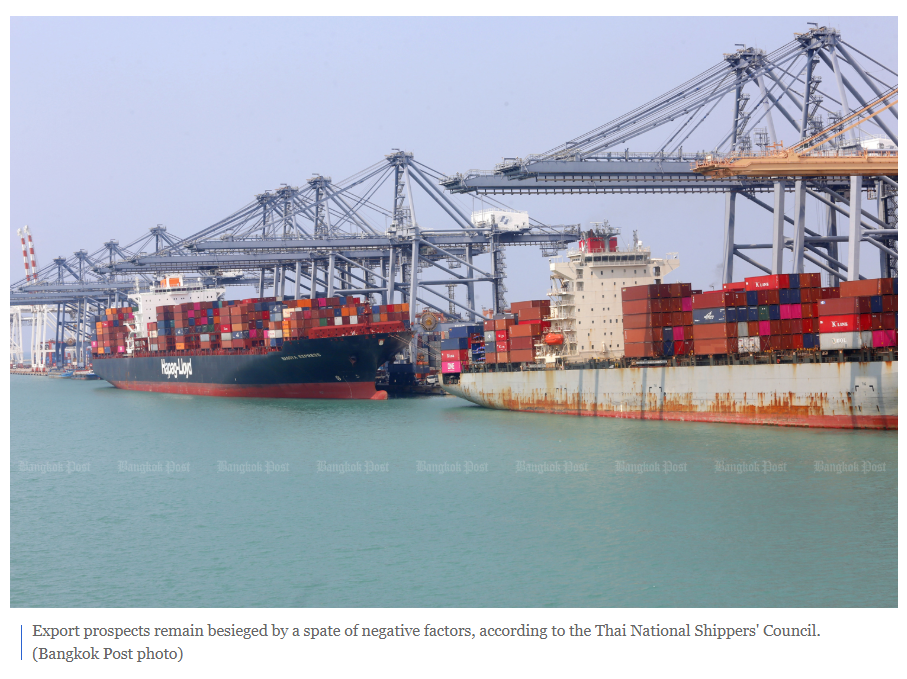Thailand: Negative factors still clouding export outlook, shippers say
Despite a rise in exports for a second straight month in April, a key trade group is maintaining its export forecast at an 8% contraction this year.
The Thai National Shippers’ Council (TNSC) cited uncertainty over the end of the coronavirus crisis, the economic slowdown of key trading partners and relatively weak purchasing power because of rising unemployment.
TNSC chairwoman Ghanyapad Tantipipatpong said on Tuesday that export prospects remain besieged by a spate of negative factors, especially the pandemic ravaging important trade partners like the US and the EU.
A renewed trade war between the US and China, ongoing protests in Hong Kong, the strengthening baht and rising oil prices are challenges for Thai exports, she said.
“Despite exports rising 1.2% year-on-year to US$81.62 billion in the first four months, the growth was driven largely by gold, oil and weaponry,” Ms Ghanyapad said. “Excluding gold, oil and weaponry, exports still fell by 0.96% in the period.”
The Commerce Ministry reported on May 22 that customs-based exports unexpectedly rose by 2.1% year-on-year to $18.94 billion in April after a surprise 4.2% increase in March.
Exports of agricultural and agro-industrial products grew 4% in April to $3.73 billion, boosted by rising global food demand during the lockdown period.
Higher shipments were led by rice (+23.1%), fresh, frozen and processed fruits and vegetables (+5.7%), fresh, frozen and processed chicken (+9.6%), pet food (+34.3%) and seasonings and condiments (+18.9%).
Exports of industrial products grew 4.1% to $14.77 billion, led by gold (+1,102.8%), aircraft and accessories (+584.7%), other vehicles and parts (+1,423.1%), semiconductor devices, transistors and diodes (+56.1%) and electric circuits (+1.8%).
Excluding gold, oil and weaponry, April exports fell by 7.5% from the same month last year.
Exports to major trading partners stood out in April, especially those to China and Japan, rebounding 9% and 9.8% respectively, while shipments to the US and Asean continued to grow.
Exports to the EU, the Middle East and South Asia fell in April, constrained by the pandemic and lockdown measures.
Based on consultations with business operators, the TNSC believes that products likely to recover their growth in the second and third quarters include computers and parts, electric circuits, machinery and parts, and food.
In the third and fourth quarters, products expected to see good growth include electric appliances, rubber products and chemicals.
Segments expected to resume export growth in the first quarter of 2021 include automobiles and parts, plastic pellets, oil, and gems and jewellery (excluding gold).
In a related development, Ms Ghanyapad said the council spoke with trade associations and industry groups and they agreed that Thailand should join the Comprehensive and Progressive Agreement for Trans-Pacific Partnership (CPTPP).
She said participation in the CPTPP would help boost the country’s overall economy, investment and international trade.
Ms Ghanyapad urged the government to clarify details of the pact and negotiate for the best benefit of the country, especially in areas of existing concern such as International Union for the Protection of New Varieties of Plants (UPOV 1991) regulations, Thai plant development and genetically modified organism (GMO) controls.
Source: https://www.bangkokpost.com/business/1928504/negative-factors-still-clouding-export-outlook-shippers-say


 Thailand
Thailand




